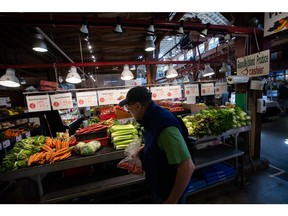Opinion: Soil is becoming an increasingly scarce commodity, diminishing in quantity and quality with what will be disastrous consequences

Article content
Canadians are feeling the effects of rising food prices and politicians are conducting an energetic search for scapegoats.
Is it the carbon tax? Climate change? Greedy grocery store magnates?
It may be an amusing pastime, but the blame game hides a far more serious problem.
Soil — that critical ground under our feet — is becoming an increasingly scarce commodity, diminishing in quantity and quality with what will be disastrous consequences for food prices and our food supply itself unless we begin to take this problem seriously.
Advertisement 2
Story continues below
Article content
This was among our most alarming findings during a recent Senate study of Canada’s soil health.
As chair of the Senate Committee on Agriculture and Forestry, which undertook this study, I heard clear and convincing evidence that soil health is at risk.
Soil degradation and the loss of agricultural land is taking place in every region of Canada — farmland area alone declined by eight per cent between 2001 and 2021. While scientific advancements in soil management and agricultural practices have allowed crop yields to continue to increase, these techniques also obscure the fact that a crucial resource is being rapidly used up.
In B.C., for example, ocean waters are moving further upstream in the fertile Fraser River delta, leading to saltier soil that is less productive. More intense rainfall is contributing to soil erosion. And prolonged periods of high water are reducing the amount of time farmers can spend in their fields, leading to soil compaction, which reduces the space available for water and air.
Ontario, meanwhile, is seeing a decrease in soil organic matter, which helps give plants nutrients. This is also evident in Quebec and the Atlantic provinces.
Article content
Advertisement 3
Story continues below
Article content
This is not a uniquely Canadian phenomenon. The Food and Agriculture Organization of the United Nations estimates that more than 30 per cent of the world’s soils are already degraded.
In his book The Third Plate, New York chef Dan Barber recalled sampling “astonishingly delicious” carrots. It turned out that the carrots boasted an exceptionally high sugar content; testing revealed the presence of healthy oils, amino acids and proteins that came to the carrot through soil alive with nutrients and microorganisms.
Later, he tested one of his kitchen’s stock carrots. It showed no detectable sugar whatsoever.
Even though it was an organic carrot, it had been grown in sandy, nutrient-poor soil with just water and fertilizer. Growers fed the carrot, but they didn’t feed the soil, Barber wrote.
The efforts of a successful chef to find a sweeter carrot may seem far removed from the lived reality of Canadians struggling to feed themselves, but there is an important public health lesson here as well.
Barber describes a study undertaken by pioneering soil expert William Albrecht in 1942, in which Albrecht was given access to Missouri’s military draft records. He found that men from areas covered in washed-out soil were more likely to be unfit and rejected for the draft, while men from the northwest and its more mineral-rich soils were half as likely to be rejected.
Advertisement 4
Story continues below
Article content
It was powerful correlation between healthy soils and healthy bodies.
“Proven societal benefits [of healthy soil] include cleaner water, enhanced biodiversity and reduced threats from flooding,” committee witness Duane Thompson told us.
“Farmers benefit from increasing productivity, greater resilience in the face of a changing climate, reduced environmental liability and better overall profitability, while consumers gain in terms of greater food security, fewer environmental concerns and healthier, more nutrient-dense food.”
Summoning Galen Weston to Parliament might be great theatre, but it’s hardly good governance.
The recommendations in our report show what should be done to ensure a stable, abundant and affordable food supply. The 25 recommendations include federal tax credits for farmers, ranchers, and growers who have adopted, or are adopting, innovation and technology that support soil health. We also recommend the government of Canada collaborate with the provinces and territories to support the development of a consensus on how to measure, report, and verify soil health.
Senator Rob Black is a passionate advocate for agriculture and chair of the Senate Committee on Agriculture and Forestry. He represents Ontario in the Senate of Canada.
Article content



Comments